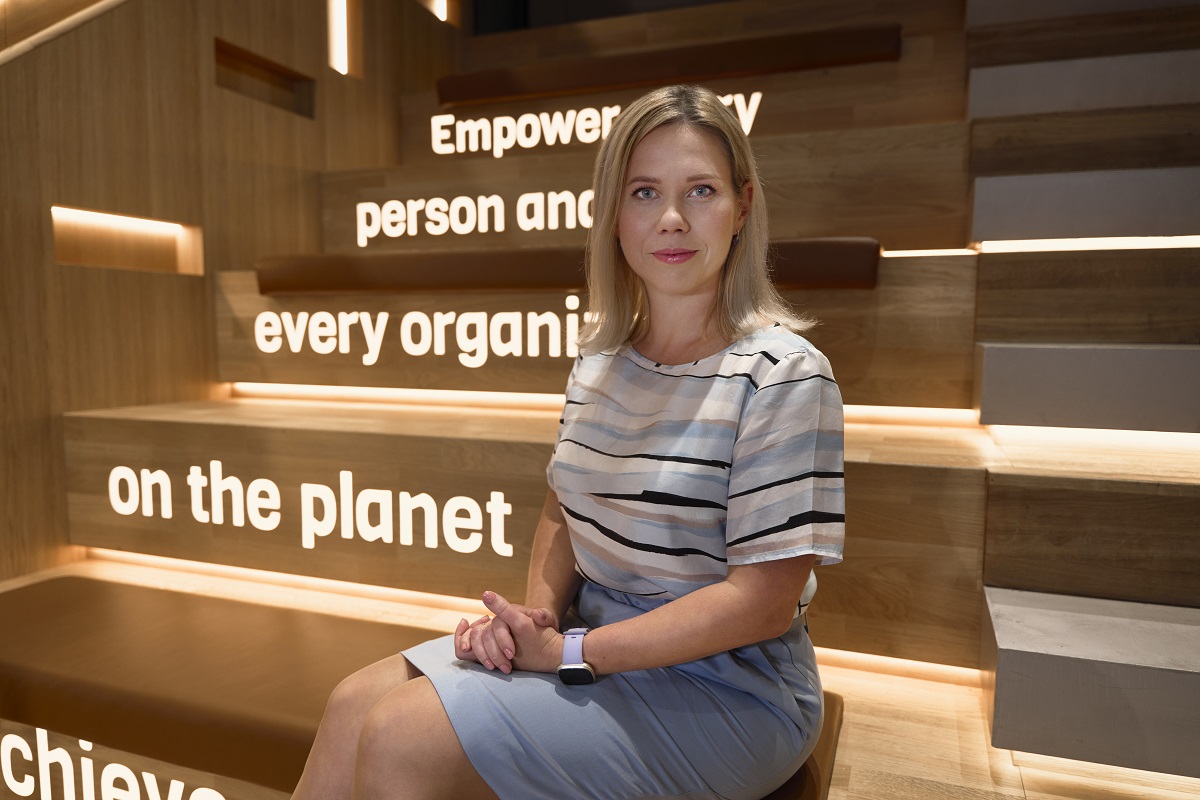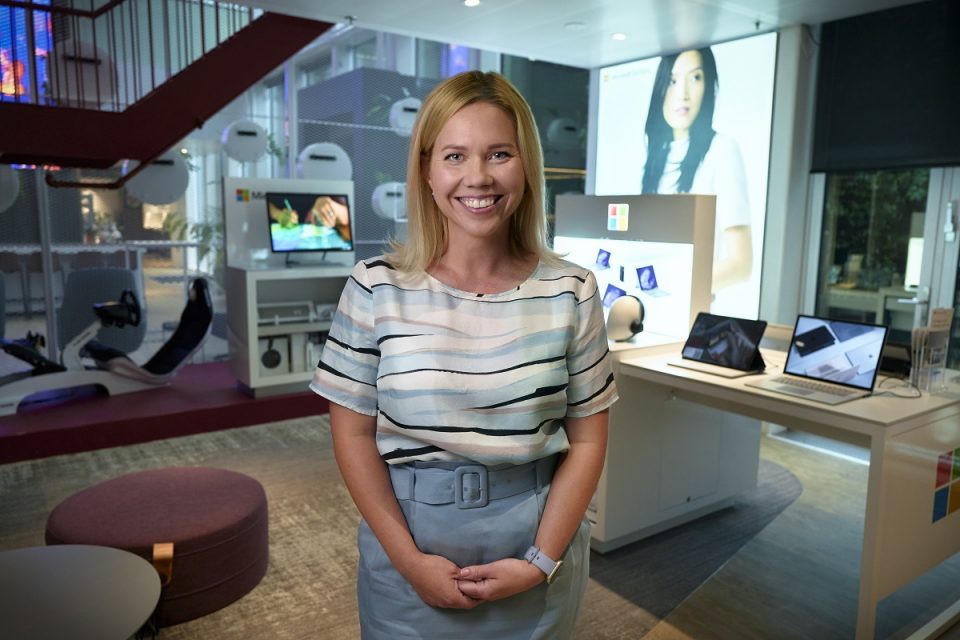Technology plays a vital role in the growth of a modern business. In order to be on par not only with competitors but also with the rest of the world, various industries are increasingly adopting technologies that can successfully maintain their business processes and realize their full potential.
But what can we expect from AI and IoT, which have become key technologies in 2022? In what direction will they steer the business? How will they determine the future of jobs? The answers will be given by Azure’s business leader for CEE, Microsoft, Natasha van Putten – Gorkova. Coming from the field of ICT engineering, she has more than ten years of experience, holding marketing and strategic business roles at Microsoft. In addition, Natasha is passionate about cloud computing, research into new technologies, and the development of cloud products.
Could you share the main trends and profitable strategies that IT leaders follow? What are your observations about the market? How do you think it is developing?
What I can share as my personal observation is that the need for digitalization of business is increasingly urgent. It costs less and less to bring new technology to market, and at the same time, disruptive events are becoming more common. Therefore, investing and fostering new growth initiatives is an important priority. The hybrid model of work has become completely normal and our business is more and more connected. Everything in one project – from sales, through customer service, to production can now be coordinated and carried out remotely. Every business is a digital business, so building digital opportunities is paramount. We are noticing changes in people’s approach to business – there is already an emphasis on advanced technologies such as artificial intelligence to affect the KPIs of a company.
And the most important thing we need to emphasize now and in the future is the need to protect every process – from beginning to end. Security must come first. Cybersecurity is the biggest threat to digital transformation today and, at the same time, the number one risk facing any growing business. Every organization needs comprehensive tools for identity, compliance, confidentiality, and governance. We at Microsoft work daily to improve our services and provide high security to all businesses and consumers.
Azure is one of Microsoft’s largest and fastest growing businesses and an important focus for the company, which describes its business strategy as “first mobile device, first cloud space.” And given Microsoft’s strength in the industry and corporate business, it’s clear that Azure is well positioned for continued growth in one of the most critical areas of technology. How ready are the cloud infrastructures for Vision 2030?
Yes, Azure is the fastest-growing professional cloud platform offered by Microsoft. The material base is growing extremely fast. It currently consists of 160+ data centers located in over 60 regions and interconnected by one of the largest interconnected networks on the planet. This allows our customers to operate applications they use close to their employees and customers, wherever they are, and to comply with their local storage requirements. We recently announced new regions in Israel, Mexico, Spain, Italy, New Zealand, and Central Canada.
We strive not only to meet local data processing requirements but also to provide daily innovations that provide technological skills and jobs in many markets, as well as improve the user experience with the cloud, such as reducing latency. All of this demonstrates Microsoft’s commitment to digital market transformation.
Given the rapidly evolving pace of innovation, we are constantly expected to meet the needs of our customers. This is true for both today and the future. In the last year, we launched over 1000+ features in AI, Kubernetes, databases, and much more to ensure that we offer the most innovative services to all our users.
- In Horizon 1, we see an increase in consumer demand. That’s why we’ve invested in engineering and sales to ensure we build the product/service I need. An example of this is Cloud Infra / Managed databases.
- In Horizon 2, you will see how we lean on AI and mixed reality capabilities as we see our users’ growing needs and benefits.
- We are also planning and developing Horizon 3. For example, Quantum is an area in which we are investing because we see potential in the future capabilities of this service, and we want to be at the forefront of this.

Can you tell us what Microsoft’s attitude is about security? How does Microsoft deal with threats?
Security is of great importance to us and should be part of any discussion with users and partners, especially when it comes to data. We cannot accept that if the perimeter is secure (the network), that our data is necessarily secure – security needs a multi-layered approach.
It is important to note that cybercrime costs economies over 6 trillion each year, and massive growth is yet to come. It is also important to note that it is not just companies that are the target of cybercrime. According to recent reports, one third of all cyberattacks target small businesses. And after being attacked, 61% of small organizations are unable to recover and return to normal. Providing security and services to an organization has never been easy. Still, with hybrid operations and increased digital attack area, it is now much more difficult for organizations in any sector and of any size.
In the last two years, the frequency and complexity of cyber events have increased dramatically. We can share a few basic security principles that we follow:
– Philosophy of zero trust with 3 main questions – Who are you? What do you need? Can I trust you?
– Our approach covers 5 key areas: identity, security, compliance, confidentiality, and management.
– Microsoft Cloud and Cloud Defenders provide end-to-end protection and protect all data, devices, identities, platforms, on-prem and multi-cloud.
What do you think is the future of AI and IoT? Don’t you think this is a topic we are not ready for yet?
Technologies such as AI and IoT are everywhere, including in our company. Everything that can be connected will be, and consumers will expect just that. In addition, the way we interact with computers is evolving at a swift pace. An increasing number of products and services are expected to have AI capabilities with built-in learning and adaptation capabilities. This will again become a consumer expectation. The Internet of Things is growing significantly as there is a hunger for real-time review of global operations (Digital Twins) and the cost of labor, as well as a shortage of skills that require companies to modernize. With AI, you get a substantial positive return on investment very quickly. It also significantly eliminates human error and achieves a state that considerably optimizes maintenance efforts and budgets. But at the same time, the need for new structures for responsible AI management is growing.
Microsoft has developed such a structure: We are committed to ensuring that AI systems evolve responsibly and in a way people trust. We apply our principles for responsible AI development under the guidance of committees that advise all our teams and administration. We also apply our principles to the services we offer to our clients and partners. Responsible AI development is based on six principles: Honesty, Reliability and Security, Confidentiality and Security, Inclusiveness, Transparency, Accountability, and Accountability.
Do you really implement artificial intelligence in your products? Does this make your products and services more successful?
We believe that the future is in AI. At Microsoft, we use artificial intelligence in almost all of our products and services. We see that many of our consumers are embarking on the digital transformation path and are also adopting this technology, which improves their companies and efficiency. I do not think this is a topic that affects only larger or more developed countries – it is a matter of company culture, views and perceptions of the company, and the desire to develop the team.
So, how do we prepare for the future? Can you share some of the skills for the new jobs that can be expected to be sought based on Cloud Vision 2030?
Most of the job positions that will exist then probably don’t exist yet, if you believe the research conducted by a number of different companies.
– Employee expectations are higher than ever. According to Microsoft’s 2022 Work Trends Report, people want flexibility and time for themselves and change positions to help them focus on their personal goals and well-being.
– According to a survey by the European Center for the Development of Vocational Training, 16% of workers in Finland, Germany, Hungary, and the Netherlands have noticed that their skills are outdated compared to two years ago; in this way, in order to remain competitive, workers will have to constantly acquire new skills, which requires flexibility and a positive attitude towards lifelong learning, as well as a great deal of curiosity.
Source: Наташа Ван Путен – Горкова, Microsoft: Съвременният бизнес по пътя на дигитализацията – kaldata.com





